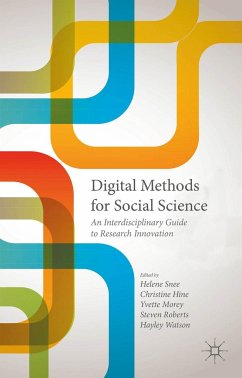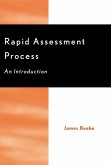This timely book inspires researchers to deploy relevant, effective, innovative digital methods. It explores the relationship of such methods to 'mainstream' social science; interdisciplinarity; innovations in digital research tools; the opportunities (and challenges) of digital methods in researching social life; and digital research ethics.
'Digital methods offer important opportunities and challenges for researchers across the social sciences. This exciting text brings a welcome critical edge to discussions of digital methods, showcasing the work of new and more established researchers, and making important connections between academic disciplines.' Christine Griffin, Professor of Social Psychology, University of Bath, UK
'This exciting volume brings together a diverse group of scholars who have both experimented with and reflected deeply about the opportunities and challenges facing social scientists wanting to make use of digital data and methods. The contributions will be of great value to students wanting to learn about the full range of methods now available to them as well as more established colleagues who are unsure about how to integrate digital methods into their existing research repertoires.' Sally Wyatt, Professor of Digital Cultures, Maastricht University, and Programme Leader of the eHumanities Group, Royal Netherlands Academy of Arts and Sciences
'This is an extremely important and informative text because it is one of the first to situate digital methods within social science methodology. It identifies the issues of using digital methods within a broad range of social science methods and in so doing shows how digital methods can contribute to the research questions that social scientists ask.' Bridgette Wessels, Reader in Digital Sociology, University of Sheffield, UK
'This exciting volume brings together a diverse group of scholars who have both experimented with and reflected deeply about the opportunities and challenges facing social scientists wanting to make use of digital data and methods. The contributions will be of great value to students wanting to learn about the full range of methods now available to them as well as more established colleagues who are unsure about how to integrate digital methods into their existing research repertoires.' Sally Wyatt, Professor of Digital Cultures, Maastricht University, and Programme Leader of the eHumanities Group, Royal Netherlands Academy of Arts and Sciences
'This is an extremely important and informative text because it is one of the first to situate digital methods within social science methodology. It identifies the issues of using digital methods within a broad range of social science methods and in so doing shows how digital methods can contribute to the research questions that social scientists ask.' Bridgette Wessels, Reader in Digital Sociology, University of Sheffield, UK









